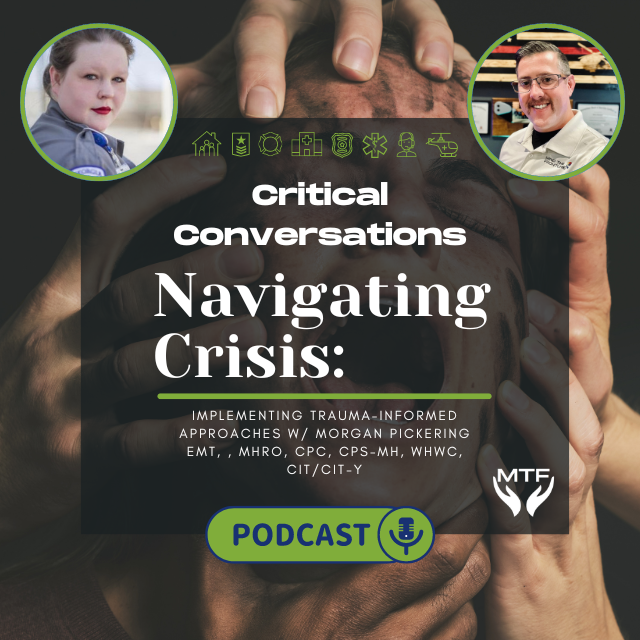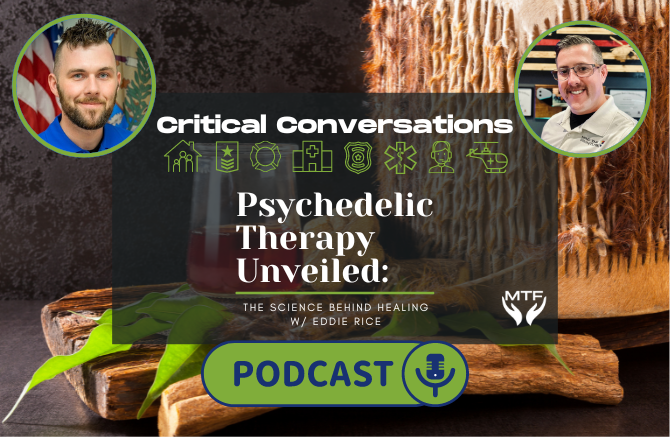Stress Response Mastery: Equipping First Responders for Optimal Performance
Mastering Stress Responses: Empowering First Responders for Peak Performance
5 min read
 Chris Smetana, AS, FP-C, CCP-C, NRP | Founder/President
:
Apr 16, 2024
Chris Smetana, AS, FP-C, CCP-C, NRP | Founder/President
:
Apr 16, 2024

Explore the importance of trauma-informed approaches in crisis management for veterans and first responders.
Trauma, whether experienced firsthand or witnessed, can deeply impact the mental and emotional well-being of individuals, especially veterans and first responders who are regularly exposed to life-threatening situations. The effects of trauma can manifest in various ways, from physical ailments to emotional distress and difficulties in forming and maintaining relationships. Recognizing and understanding the complexities of trauma is essential in effectively managing crises involving these individuals.
Moreover, trauma can disrupt an individual's ability to navigate daily challenges, cope with stressors, and engage in healthy behaviors. By delving into the nuances of trauma and its repercussions, we can develop tailored strategies to provide the necessary support and guidance to veterans and first responders during times of crisis. Through empathy, education, and specialized care, we can create a safe space for these individuals to heal and rebuild their resilience in the face of adversity.
-4.png?width=300&height=196&name=Blog%20Pictures%20(1)-4.png)
In crisis situations involving veterans and first responders, the implementation of trauma-informed care is not just beneficial but absolutely essential. Trauma-informed care goes beyond simply acknowledging the impact of trauma; it involves creating a compassionate and empathetic environment that caters to the specific needs of individuals who have been exposed to traumatic experiences.
When faced with a crisis, it is paramount to establish a safe and nurturing space that upholds the autonomy and dignity of veterans and first responders. This can be achieved through open and effective communication, the utilization of trauma-informed practices that prioritize sensitivity and understanding, and the incorporation of evidence-based interventions that have been proven to be effective in trauma-related situations.
By embracing trauma-informed care in crisis management, we cultivate an atmosphere of trust and empathy, allowing veterans and first responders to feel genuinely heard, validated, and supported during their most challenging moments. This approach not only fosters resilience and healing but also empowers individuals to navigate their trauma with strength and dignity.
-4.png?width=300&height=196&name=Blog%20Pictures%20(2)-4.png)
In addition to providing valuable insights into trauma and its impact, training programs for professionals in crisis management play a crucial role in equipping individuals with the knowledge and skills necessary to effectively identify and respond to trauma. By delving into the intricacies of trauma-informed care, these programs empower professionals to understand the unique needs and experiences of veterans and first responders, enabling them to provide tailored support and care that minimizes the risk of retraumatization.
Moreover, investing in comprehensive training and education ensures that crisis management teams are well-prepared to navigate the challenges faced by veterans and first responders. By arming professionals with the tools and resources needed to effectively address trauma, we can create a more empathetic and supportive environment that promotes healing and resilience in times of crisis. Through ongoing education and training, we can continuously improve and refine our approaches to better meet the needs of those affected by trauma.
-3.png?width=300&height=196&name=Blog%20Pictures%20(2)-3.png)
In addition to peer support groups, counseling services, and access to mental health professionals, establishing robust support systems for veterans and first responders in crisis management also involves creating a community of understanding and compassion. This community can include fellow veterans, first responders, and individuals who have undergone similar experiences, offering a sense of camaraderie and shared understanding that is essential for healing and resilience.
Moreover, incorporating holistic approaches such as mindfulness practices, art therapy, and outdoor activities can provide additional outlets for veterans and first responders to express their emotions and process their trauma. These alternative therapies can complement traditional methods of support, offering individuals a diverse range of tools to cope with their experiences and find inner peace.
By building a network of support that encompasses both professional services and community connections, we can ensure that veterans and first responders have access to a comprehensive array of resources to address their trauma-related needs. This multi-faceted approach not only promotes healing and resilience but also fosters a sense of belonging and empowerment among those who have sacrificed so much in service to others.
-4.png?width=300&height=196&name=Blog%20Pictures%20(2)-4.png)
Evaluating the effectiveness of trauma-informed approaches is a vital aspect of crisis management for veterans and first responders. By conducting thorough assessments and measurements, we can gain valuable insights into how these approaches impact individuals' well-being and recovery journeys.
Outcome measures, such as tracking changes in symptom severity, improvements in quality of life, and overall mental health well-being, serve as tangible indicators of the success of trauma-informed care. These metrics allow us to quantify the positive effects of our interventions and make informed decisions on refining and adapting our strategies to better meet the evolving needs of those affected by trauma.
Moreover, soliciting feedback from veterans, first responders, and professionals actively involved in crisis management is essential in shaping evidence-based practices. By listening to their experiences and perspectives, we can gain a deeper understanding of what works well and where improvements can be made, ensuring that our trauma-informed approaches remain responsive and tailored to the unique challenges faced by these individuals.
Consistent assessment and evaluation not only validate the efficacy of trauma-informed care but also drive continuous improvement and innovation in our support systems. By prioritizing evidence-based practices and feedback-driven refinements, we can uphold the integrity of our approach and uphold our commitment to providing the highest quality of care to veterans and first responders in crisis situations.
-4.png?width=300&height=196&name=Blog%20Pictures%20(3)-4.png)

Morgan Pickering, a Gainesville/Hall County native, graduated from the Lanier Technical College EMS program in 2012. She transitioned from an EMS career in Hall County to mental health advocacy in 2019, holding key positions in NAMI Hall County. Currently serving as a National Level EMS Educator and a Trauma Informed Mental Health Specialist in Pickens County, GA, Morgan specializes in traumatic studies, crisis intervention, and suicide prevention. She collaborates with various agencies and actively advocates for mental health support for first responders.
Explore many valuable First Responder Mental Health and Wellness resources on Mind the Frontline's online platform. Discover the link below to access a wide range of support and information tailored specifically for first responders.
Additional Mind the Frontline Resource's
Stay connected with Mind the Frontline on Facebook & LinkedIn.
$50 off code:frontline40
Invest in your mental health with the Mind Shield Health and Wellness Membership—a transformative resource tailored for first responders. For less than $4 per month, this 100% tax-deductible membership offers a suite of exclusive benefits designed to enhance your overall well-being.
Membership Highlights:
The Largest Online First Responder Mental Health and Wellness Resource Directory: Immediate access to a comprehensive database catering to the unique needs of first responders.
State-by-State Mental Health, Wellness, and Recovery Resources: Navigate a localized guide for personalized support.
MindShield 24/7 Debrief Hotline: Confidential and secure debriefing space, available whenever you need it.
Virtual 1-1 Peer Support: Connect with a supportive network of peers through our virtual platform.
Mind the Frontline's Preferred Mental Health Providers List: Access trusted mental health professionals aligned with our mission.
Discounts to Mental Health Apps: Exclusive discounts on leading mental health apps like Headspace and more.
Recommended Books, Podcasts, and Resources: Curated selection to enhance your mental health journey.
Weekly Blog Articles/Podcasts: Stay informed and inspired with regular content delving into crucial insights and topics.
Interactive Workshops and Webinars: Engage in dynamic sessions promoting mental health, career development, and overall well-being.
Mindfulness and Meditation Resources: Tools for incorporating mindfulness into your daily routine.
%20(1)-1.png)
Mastering Stress Responses: Empowering First Responders for Peak Performance
-Jul-22-2024-11-11-21-9168-PM.png)
Explore the delicate balance of handling grief and loss in emergency care settings, where compassion meets clinical expertise.

Explore the world of Psychedelic Assisted Therapy for first responders and debunk common misconceptions surrounding this innovative approach to...